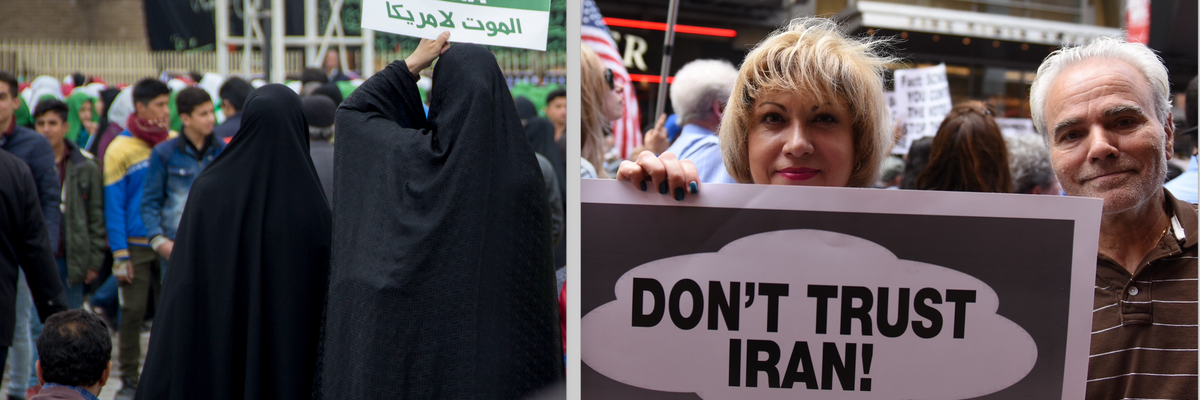A persistent feature of the antagonistic U.S.-Iran relationship since the 1979 Islamic revolution is the alignment of interests between hardliners within Iran’s theocracy and hawkish forces in the United States. The two forces consistently echo each other and spread falsehoods to achieve their shared goal of sabotaging diplomacy between the two countries.
The ongoing negotiations that began in April in Vienna to restore the 2015 nuclear deal showcase the degree of common interests between hardliners on both sides. In the United States, Senate Republicans are drawing on the outbreak of violence in Israel/Palestine to call for ending the talks and warning businesses against engaging Iran. Trump national security adviser John Bolton is also calling for breaking off the negotiations by citing remarks made by Iranian Foreign Minister Javad Zarif in a leaked audio tape.
The anti-diplomacy efforts of right-wing forces in the United States are playing right into the hands of Iran’s most zealous elements, who require anti-Americanism as a legitimizing force. Hardline opponents of the moderate Rouhani administration in Iran are themselves currently in a fury to stop the Vienna talks and the nuclear deal’s revival. After the Zarif tape was leaked, they organized a conference at the old American embassy in Tehran to denounce the Vienna negotiations themselves.
Nasrollah Pejmanfar, who heads an important oversight committee in Iran’s parliament, vociferously censured Rouhani and Zarif at the event, saying they “destroyed our nuclear industry through negotiations” and “lie to the people that sanctions will be lifted through negotiations in Vienna.” Another conservative parliamentarian, Malek Shariati, proclaimed that the “well of Vienna has no water.”
Meanwhile, Mohammad Hassan Ghadiri Abyaneh, Iran’s former ambassador to Australia, contends that Rouhani and Zarif do not seek Iran’s national interests in Vienna but “votes for their faction” in Iran’s upcoming presidential election on June 18. Another hardline parliamentarian, Mahmoud Nabavian, has blasted both Zarif and Iran’s Deputy Foreign Minister Abbas Araghchi, who is leading the Iranian delegation in Vienna, exclaiming: “I have no trust in Zarif and Araghchi. If Wendy Sherman cries once they will give all of Iran to America.”
Beneath the boisterous rhetoric of Iranian hardliners is alarm that the Vienna talks will be successful and give fresh breath to Iranian moderates after years of Trump’s “maximum pressure.” The deal’s revival will give them a chance at winning the presidential election and undercut the hardliners who require continued enmity with America to justify repressive policies and deflect from domestic shortcomings.
The nuclear deal’s original negotiation in 2015 represented a historic shift in Iranian politics. It was the most daring and promising attempt by Iranian moderates to improve Iran’s relations with the West since 1979. Rouhani has for decades pursued this goal, from the Iran-Contra deal with the Reagan administration in the 1980s, to an agreement with the Europeans to suspend uranium enrichment in the early 2000s. However, on every occasion, these efforts were betrayed by the United States.
In the aftermath of the deal’s negotiation in 2015, Iranian hardliners went to great lengths to undermine Rouhani and push back against broader outreach to the West. They cracked down on individuals seeking to build bridges between Iran and the United States, fueled tensions in the region and with America, and accused their moderate rivals of being a fifth column of U.S. influence that threatens Iran’s political system. The Trump administration reneging on the nuclear deal in 2018 greatly eased their worries and eviscerated Rouhani’s political capital.
Prospects of the deal’s revival today have led to renewed and intensified attacks by Iranian hardliners against Rouhani and Iran’s diplomats, above all Zarif. The leaked Zarif tape has been used by hardliners in both the United States and Iran to attack diplomacy, as seen in their recent rhetoric and actions. The tape came on the heels of other attacks on Zarif in Iran, including conservative-dominated state television airing a TV series and documentary that cast the nuclear deal as a U.S. conspiracy to stoke “soft regime change” in Iran and portrayed Zarif as manipulated by enemy spies.
The Zarif tape highlighted important differences within the Islamic Republic on foreign policy. Zarif castigated Russia, a country that hardliners prioritize close ties with, as trying to prevent the nuclear deal’s negotiation in 2015 out of a concern it would move Iran closer to the West. He talked about hardliner attempts to sabotage the deal, including through an attack on the Saudi embassy in Tehran and the seizure of two U.S. ships in the Persian Gulf after its implementation in January 2016. Significantly, he emphasized the need to “manage differences” with the United States and said there is “no need for conflict and tensions.”
Rouhani for his part said the Zarif tape was leaked with the aim of hurting the Vienna negotiations. Zarif faced a fierce backlash over his comments in the recording, especially those that were construed as critical of the assassinated commander of the IRGC’s Quds Force, Qassem Soleimani. He earned an unprecedented rebuke from Supreme Leader Ayatollah Khamenei, who said his remarks were a “repetition of the hostile words of our enemies.” Any presidential ambitions Zarif may have had were effectively ended with the tape’s leaking, feeding speculation the whole matter was orchestrated by hardliners.
The leaked Zarif tape was also used by anti-Iran hawks in the United States to advance the narrative that Iran is a monolithic state controlled by hardliners. This is despite Zarif’s remarks showing the intense internal contestation over the nuclear deal, which ultimately saw moderates prevail. Regardless, the reality is that anti-Iran hawks in the United States want the demise of Iranian moderates. They prefer an Iran dominated by hardliners, which would be easier to isolate and maintain perennial enmity against. Trump’s former Iran envoy Elliott Abrams has said this quiet part of their agenda out loud in the past, when he wrote that he hoped the conservative Ebrahim Raisi would triumph over Rouhani in Iran’s 2017 presidential election.
Trump’s presidency was a gift to anti-Iran forces in Washington, Israel, and Saudi Arabia. Their core objectives have been to isolate Iran, maintain economic sanctions imposed on it, and ensure U.S.-Iran hostility continues unabated. These forces have consistently tried to create impediments to U.S.-Iran diplomacy, including by trying to provoke Iran into escalation, which was evident in the recent act of sabotage against an Iranian nuclear facility that was widely attributed to Israel and occurred just as the Vienna talks started.
The hardliners on all sides may now be getting their wish amid reports that Iran does not want an agreement on restoring the nuclear deal before its presidential election in June. This would not be surprising, given the embattled Rouhani has become a lame duck in the truest sense and hardliners are using every means at their disposal to ensure their electoral victory. If this turns out to be the case, it will put the Vienna process on even shakier ground. The reaction of hawks to the current violence in Israel/Palestine shows that U.S. hardliners have their knives out to kill diplomacy with Iran. Their counterparts in Tehran are sure to give them plenty of fodder in the run up to June 18.
















